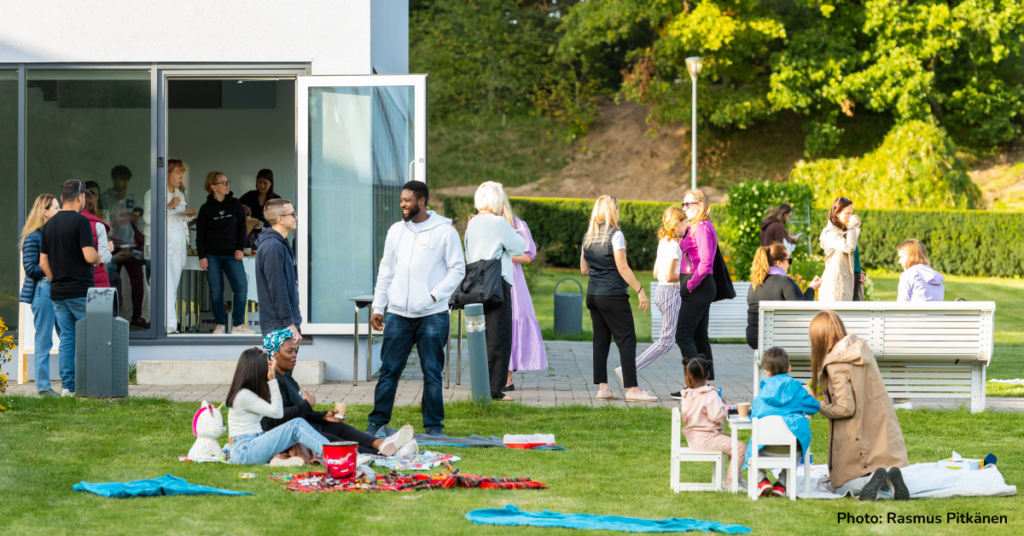Tips for a foreign family to find a community in Estonia
Having your own community is central to a fulfilling life. It offers support, a sense of belonging, and opportunities for development. Even if people think they can do it on their own, it’s a well-known fact that people who belong to a community are happier, healthier, and more active. For this blog post, we have teamed up with MoveMyTalent to highlight how to find this community.

Community picnic of MoveMyTalent with foreign talents and their families, Sept 2023
Photo: Rasmus Pitkänen
Arriving from a new country or even returning as an Estonian, one has to start building their life here all over again. The creation of a social network that has lasted for years, needs to be started again from scratch. However, it is always more difficult in an unfamiliar environment, and if it doesn’t work out, it may happen that people simply leave because there is nothing “keeping” them here.
MoveMyTalent helps companies relocate foreign talents to Estonia mostly in the ICT and start-up sector, but also in other critical roles. These wonderful people are crucial for their employers and for our country’s economy, and we definitely want them to stay here for a long time. So it is also very important that, in addition to them, their families adapt well here. Therefore, alongside MoveMyTalent’s core business of immigration and relocation services, they have taken the topic of the whole family’s adjustment to their hearts.
Since 2019, MoveMyTalent has been carrying out Work in Estonia’s program “Re-invent yourself in Estonia” to assist in the integration of expat spouses into professional life. Annual traditions include also community picnics and other initiatives to help to bridge the gap between people.
For non-Estonians, we recommend, first of all, to get familiar with the nature and background of Estonians. As Estonians, we tend to be more reserved compared to some other cultures, so just bare in mind that gaining trust and building good relations with us may take a little longer. Keeping a distance from foreigners might be confused with xenophobia or rudeness, but for the most part, this is not the case – often the reason is just in not knowing how to react or minding one’s own business. But if you put in a little effort, a sincere and great friend for life will emerge from beneath the hard shell.
What would be the best ways to find your community in Estonia? In this article we will focus more on families where one partner is at home with the children. A sense of community and belonging ultimately comes together from several different aspects:
• One fundamentally big decision that you might want to consider is sendng your children to an Estonian-speaking kindergarten and/or school. In the beginning, it will be a bit difficult in terms of language, but after a few months, children can already make themselves understood and also make local friends. Parents can have the opportunity to get to know other children’s parents at joint events and birthday parties. And since English language is taught and spoken at a good level in Estonia, you don’t have to worry that your children will miss out on it, if they choose Estonian.
• Engage in your favourite hobby or sport in Estonia as well. Usually, to become acquainted and friends with Estonians, it takes a number of recurring get-togethers, so a hobby-activity where you meet with the same group every week, would be a great chance for it. New acquaintances can be made anywhere, e.g., in a choir, a pottery or a hiking club, and after befriending you can do something interesting together. Be sure to keep an eye on the social media posts of interest groups (Facebook is very popular with us).
• In Estonia, especially in larger cities, you can also get by with English. At the same time, speaking the language even at a basic level helps integrate better and win the hearts of the locals. Take part in Estonian language courses or learn by yourself using digital tools. The International House of Estonia also hosts a language café twice a week for those, who have already passed the A1 level and want to practice a bit more.
• Participating in local events gives an idea of Estonian culture and offers communication opportunities, e.g., street festivals, fairs, or children’s events. Be a part of local celebrations and holidays, such as Estonian Independence Day or Christmas markets.
Don’t have Willuwalk yet? You can get it here, for free, of course.
